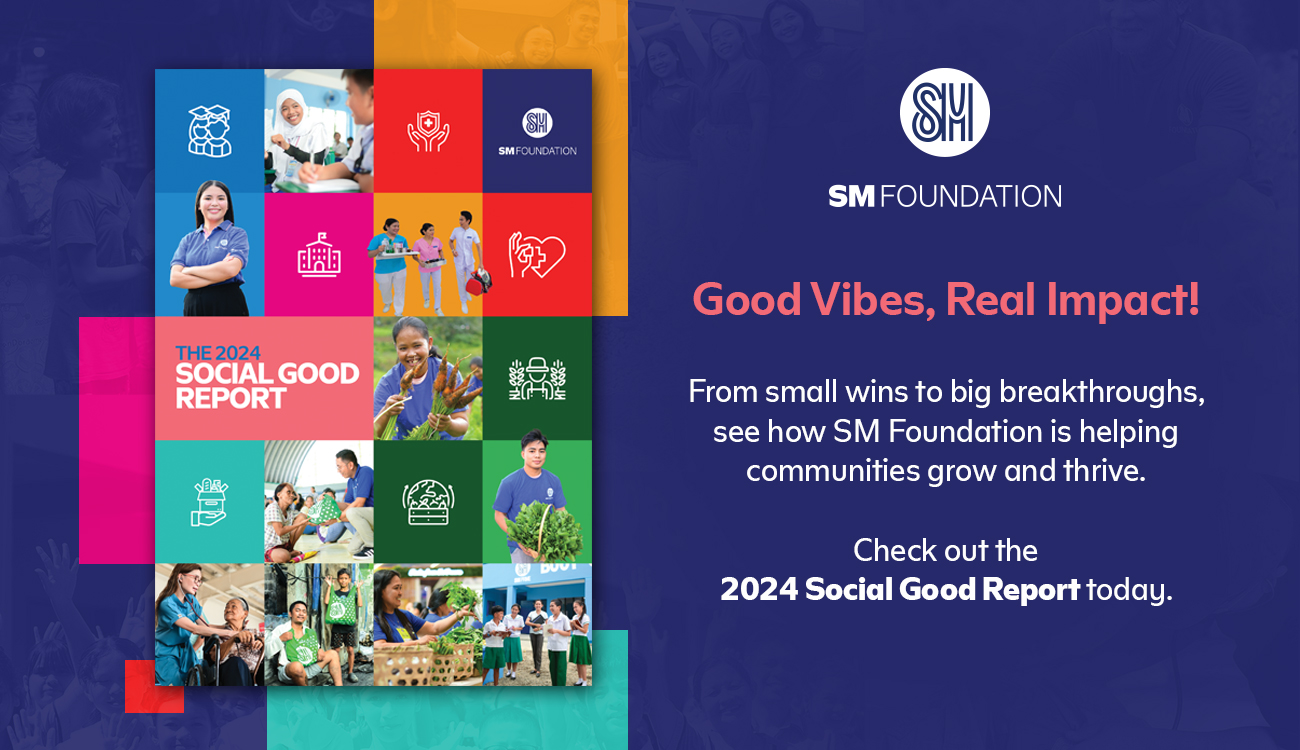From farm to market
SM Foundation’s sustainable agriculture program teaches farmers effective farming
Farming was farthest from Lemie Leonida’s mind back in 2009 when she retired from teaching Math after 21 years at Lambunao National High School in Iloilo. Leonida, 53, said she looked to other sources of income after Typhoon Yolanda (international name: Haiyan) literally swept away her husband’s sand and gravel business in 2013.
“Everything was washed away—the building, our cement stock—tinangay lahat ng baha (all of it was washed away by the flood). Even our fish pond and farm were affected,” Leonida said.
To get back on her feet, Leonida joined the Kabalikat sa Kabuhayan (KSK or Partners in Livelihood) Program which she found out from a classmate who was interested in farming.
After graduating from the KSK program, Leonida started supplying the Red Lady Papaya to several markets including SM City Iloilo Supermarket. She continues to produce an average of 500 kilos of papaya a week for her clients. In a month, Leonida sells an average of 2,000 kilos of papayas, earning PHP50,000.
“The KSK program has helped me augment the financial needs of my family. More than that, I can see its potential because people want to live longer and supplying fruits and vegetables to contribute to this growing lifestyle,” she said.
Tatang’s brainchild
The KSK program is the brainchild of retail pioneer Henry Sy, Sr. Harbest Agribusiness Corporation’s Arsenio “Toto” Barcelona, SM Foundation’s partner in the KSK training program, recounted how he met Sy in 2006 who was exploring opportunities of putting together a social development program in Tagaytay Highlands.
“I told Mr. Sy about what Harbest has been doing, particularly training farmers and he liked the idea,” Barcelona said.
He added, “Mr. Sy’s instruction was very simple to create a similar program for SM Foundation where small-scale farmers can learn improved farming technology. After a week, Cristie (Angeles of SM Foundation’s Livelihood program) called me up to try it out. We decided to start in Bacolod City.”
The first KSK was conducted in May 2007 with 102 farmer graduates from 36 barangays in eight municipalities in Negros Occidental. Because of the success of the maiden training program, SM Foundation replicated it in more areas, servicing over 500 municipalities all over the country to date.
With self-sufficiency of farmers as the main objective, the program educates them on the proper planting and harvesting procedures as well as introduces them to the latest farming methods and technologies. The training program is done nationwide, offering lectures and hands-on exercises as trainees grow crops on a 5,000 sqm demo farm.
“Sa pagpasok ng SM Foundation and Harbest, nagkaroon kami ng makabagong ideya sa tamang paraan ng pagsasaka at napataas ang kalidad ng aming ani (Through SM Foundation and Harbest, we were taught on the right way to farm which heightened the quality of our crops),” said Rogelio Apostol, a recent San Jose Del Monte, Bulacan KSK graduate.
The year 2013 marked innovations in the program that included a formal partnership with the Department of Social Welfare and Development (DSWD) through their Sustainable Livelihood Program and Pantawid Pamilyang Pilipino Program (4P). Under a memorandum of agreement, SM Foundation will allocate 50 slots for every batch to 4P’s beneficiaries. In turn, DSWD will conduct Community-Driven Enterprise Development sessions to all the training participants.
By end of 2014, SM Foundation has conducted 80 KSK training for 10,080 farmers from 1,657 barangays in 479 municipalities nationwide. Last year also highlighted the significance of providing a sustainable livelihood for the survivors of calamities in the previous year specifically of Super Typhoon Yolanda, the magnitude 7.2 earthquake in Visayas, and the uprising of Muslim rebels in Zamboanga as well as insurgencies in other areas.
Going for 100
As of June 22, 2015, the KSK program has already conducted 90 trainings from Isabela to Zamboanga, benefitting 11,329 farmers from 1,830 barangays nationwide. By the end of 2015, SM Foundation targets to complete its 100th batch of trainees, for a projected total of 13,000 farmer graduates.
“Moving forward, SM Foundation will continue to provide more farmer trainings to ensure food security through sustainable agriculture,” said Cristie Angeles, SM Foundation Assistant Vice President for Livelihood. “We hope to strengthen the market linkages between farmers, SM, and the local markets through the help of our partner agencies. KSK is proof that public-private partnership works well.”
While the livelihood project continues to touch the lives of marginalized families by reaching out even to the remote rural areas all over the country, it also provides new knowledge and skills, and most especially, instills the value of self-resiliency while helping others and improving lives.
